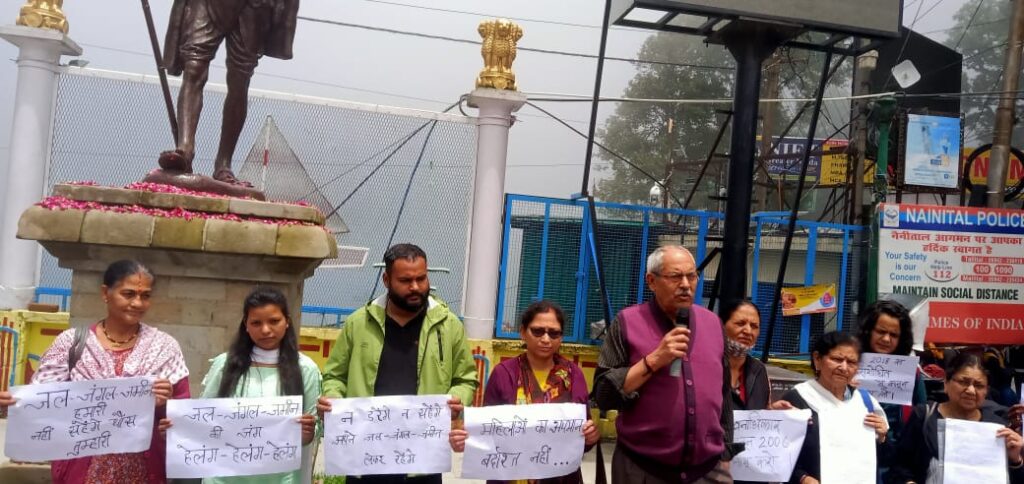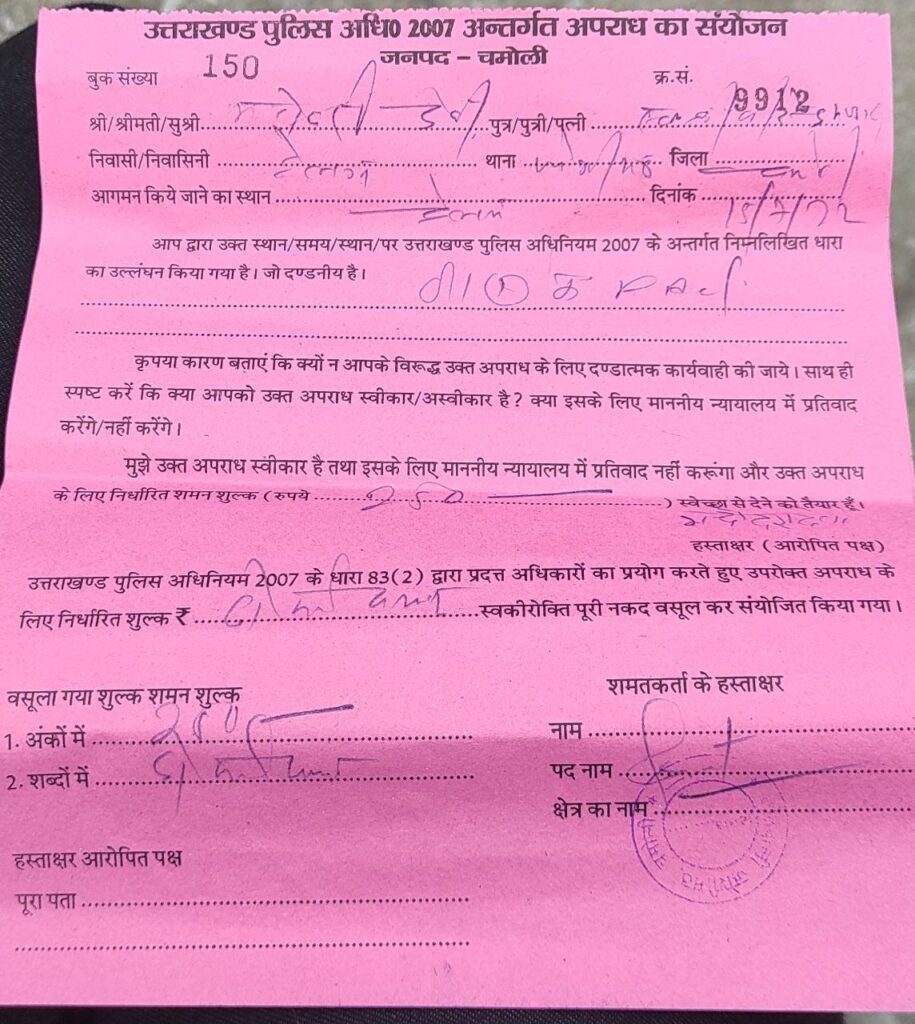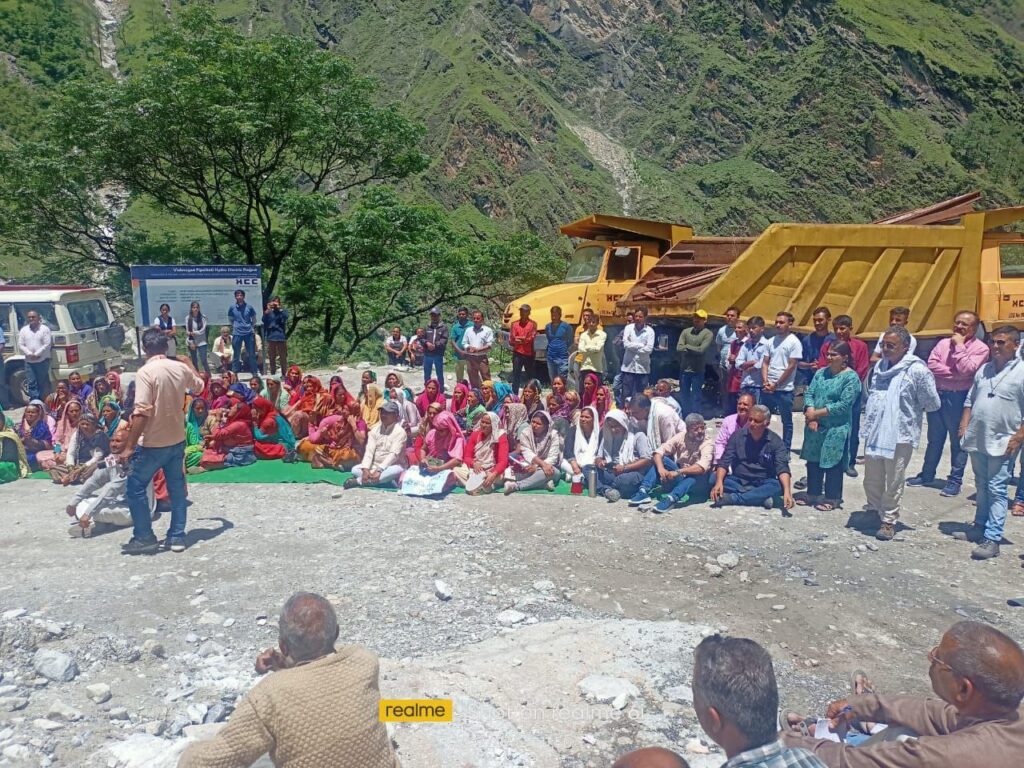Hundreds of locals along with indigenous political-social workers of Uttarakhand gathered in the Helang (Chamoli) recently to protest against the detaining of local women by the security officials and condemned their mistreatment by the local administration.
The local women were reportedly collecting fodder for their cattle and on their way back home when they were detained by the police officials and CISF security personnel with the orders of local administration. The detained locals said that the police officials favor the interests of the officials from Tehri Hydroelectric Development Corporation (THDC) who according to locals “continue to occupy their grazing lands with the help of some local village headmen from the Gram Sabha.”
THDC is running its Vishnugad-Pipalkoti Hydel project in the region. The land for the project was earlier used by the villagers for collecting cattle fodder and forest products. Villagers who are now protesting for their indigenous rights are demanding that the officials allow them to move about the land. They claim that the lands handed over by the villagers for the project are being used as dumping grounds.
Recently, a video shot at the Helang protest where one of the detained women – Madhodhri Devi was seen talking to reporters about the villagers’ plight, had gone viral.
As word spread, protests demanding rights of indigenous people spread across other regions of Uttarakhand.

Amid reports of self immolation attempt by protesters who were allegedly trying to save their homes from being demolished near the Vishnugad-Pipalkoti hydel project site, there have also been some mention of the alleged overlooking of the site’s archaeological significance.
A report has been published in The Frontline that a village namely Haat Village also known as Noni Kashi has ‘vanished’ owing to garbage disposal in the project site. This village, according to the report, has archaeological importance and has a connection with the ancient Vedic Scholar and teacher Adi Shankaracharya, who is believed to have established a Lakshmi Narayan temple there. The Archaeology Survey of India has noted that the temple is ancient and dates back to the ninth and tenth century, according to the report. This led to many activists claiming that vibrant and ancient culture was being destroyed allegedly because THDC wanted a place for dumping debris.
One of the organizers of the protest, Indresh Maikhuri told The Voices that the government should respect indigenous people’s rights to land, ensure those defending those rights are free from harassment and the threats. There should be a thorough investigation of all threats and attacks on the people, he said and demanded legal action against the CISF and police personnel for snatching cattle fodder from women, detaining them for six hours and keeping one and a half-two year old girl child in custody briefly.

Maikhuri further demanded that the approval of the Van Panchayat taken in violation of the originally established Van Panchayat rules should be canceled, on the basis of this illegal permission. He said legal action should be taken against those who cut trees. Similarly, the “so-called permission taken secretly by the Gram Sabha should also be canceled,” he added.
He sought that Helang case should be investigated by a serving or retired judge of the High Court. He said arrangements should be made to monitor the works of THDC and other project producer companies with public participation.
It may be recalled that there are 45 hydro-power projects in Uttarakhand, according to Uttarakhand Jal Vidyut Nigam (UJVN). The projects involve blasting of hillsides, excavation, debris dumping, movement of heavy machinery and diversion of forests and rivers. Environmentalists say that this can cumulatively impact the Himalayan ecology. Last year flash floods in Rishi Ganga Valley completely destroyed the Rishi Ganga Hydel Project. Many lives were lost and the devastation cost the exchequer dearly.
Experts say that a brief research with scientific and social approach is needed on the ongoing hydel projects in the Uttarakhand State so as to build a comprehensive framework to decide about the effects for these hydel projects in the sensitive area of Himalayan regions. Also, there is emphasis on the urgent need to recognize the risks associated with these large scale hydro-power projects in the Himalayan regions so as to mitigate the after effects of these projects on the people living in these mountains.

The indigenous local women who were detained by officials at the Tehri Hydroelectric Development Corporation (THDC) project site were later released after being booked under Section 81 of the Uttarakhand Police Act, 2007 after a payment of Rs 250-250. Protesters demanding justice for the locals point out that the issuing of challan (in pic) against these women under Section 81 of the Uttarakhand Police Act is in itself an action taken outside the purview of the Act. Chamoli district authorities did not respond to questions from The Voices regarding the protests and the demands of people in Helang.
Photos By: Rakesh, Rajiv Lochan Sah, Nainital Samachar and Indresh Maikhuri
Edited by: V. Prem Shanker

